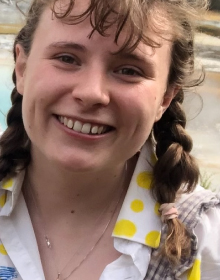Words to live by

Mercy Alberta Jocelyn uses ancestral storytelling, poetic inquiry and Nordic folklore to bridge the divide between identity, land and Indigenous worldviews.
Where are you from?
I was born and raised in Auckland, the largest metropolitan city of Aotearoa, New Zealand.
Where, and in what area, did you do your undergraduate or previous graduate work?
I completed both my undergraduate and honours degrees at Waipapa Taumata Rau, the University of Auckland. As an undergraduate I completed a Bachelor of Arts double majoring in politics and international relations with a focus on Indigenous politics, and European studies with a focus on Russian language. After graduating, I went on to complete my Bachelor of Arts, Honours degree in anthropology.
Why did you choose to pursue a graduate degree?
I had an amazing support system. My mother, who was in the midst of her own PhD at the time, and my honours supervisor, Dr. Nicole Perry, both encouraged me to continue pursuing my education.
Why did you choose Memorial for graduate studies?
My honours thesis studied how Indigenous Māori identity construction through pūrākau, or cosmological storytelling, could serve as a means for settler populations to understand their own identities through their ancestral heritage narratives. After graduating, I knew that anthropology wasn’t the right fit for me moving forward, but living in New Zealand there weren’t a lot of other options. I was then encouraged to look into Canadian universities and found Memorial, the only school to offer a degree in folklore studies taught in English.
What is your degree program and area of specialization?
I am currently pursuing my master’s degree in folklore specialising in Nordic heritage folklore and research creation.
What is your research/thesis about?
My thesis investigates the primary research question: How can heritage folklore and embodied, place-based knowledges enable me to better understand myself in relation to the environment? I grew up in Aotearoa as a descendant of settlers living on lands that are not my own, whilst simultaneously being educated according to kaupapa Māori (Indigenous pedagogical) frameworks. As such, I have always felt caught between two worlds, especially in relation to my engagement with my environment.
According to Māori world views, the environment is a relative, connected to human beings through layers of ancestry, with the first human being having been molded from the pubic clay of the earth mother, Papa-tū-ā-nuku. However, according to the neoliberal system that informs my country’s political and economic process, as well as the global capitalist system of which my country is a part, the environment is a commodifiable resource that can be freely extorted in pursuit of individual wealth and freedoms. My thesis is a reaction to that duality.
I thus draw on the world conception gifted to me by my teachers and peers to frame my ideas, centring whakapapa, or complex inter-human and human-environment lineages, as a methodological lens. Through that worldview, I study kennings, a poetic form of communication, and rock-art, a place-based, material form of communication, as folklore drawn from my Nordic heritage to understand environmental relationality as it existed for my ancestors.
Using creative research methods —namely poetic inquiry and memory poiesis—I unpack how I can decolonise my world conception by engaging with my heritage folklore, and, in turn, can develop a stronger relationship with my environment and the Indigenous Peoples who are of the lands that I call home.
What is the goal of your research?
The goal of my research is to draw attention to the ontological and epistemological rift between Indigenous and settler ways of engaging the environment, while actively working to unravel and reconcile those world views in a way that enriches Indigenous-settler relations and confronts our current global ecological crisis. My secondary aim is to exemplify the importance of creative research approaches within the humanities.
How do you work with your supervisor?
I am lucky enough to have two wonderfully supportive supervisors: Dr Kelley Totten from the Department of Folklore, and Dr Michelle Porter from the Department of English. Kelley supports me to situate my work within folklore as a discipline and to create an academic framework within which my creative practice can flourish. Simultaneously, Michelle nurtures my creative practice, supporting me to develop my poetry and engage with Indigenous academic perspectives.
While she is not my direct supervisor, I would also like to acknowledge the incredible support I receive from Dr Sylvia Moore, dean of the School of Arctic and Sub-Arctic Studies on the Labrador Campus, whose course People, Place, and Identity has greatly supported and reaffirmed the methodological approach of my thesis.
Do you have any advice for current and/or future graduate students?
My main advice is to make sure you are studying something you are passionate about and to find people who are equally as passionate about your ideas to work with. Graduate studies are hard, but it is so much easier to push through and produce your best work when you are studying something that enlivens your passions with people who have your back and want to help you succeed.
Become a graduate student at Memorial. Apply online today!